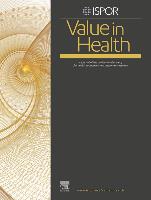Global Panel Developed New ISPOR Good Practices Report
 Lawrenceville, NJ, USA—April 13, 2021—ISPOR, the professional society for health economics and outcomes research, announced today the publication of new guidance on how to evaluate the quality and risk of bias in systematic reviews with cost and cost-effectiveness outcomes. The report, “Critical Appraisal of Systematic Reviews With Cost and Cost-Effectiveness Outcomes: An ISPOR Good Practices Task Force Report” and the accompanying ISPOR Criteria for Cost-Effectiveness Review Outcomes (CiCERO) Checklist was published in the April 2021 issue of Value in Health, the official journal is ISPOR.
Lawrenceville, NJ, USA—April 13, 2021—ISPOR, the professional society for health economics and outcomes research, announced today the publication of new guidance on how to evaluate the quality and risk of bias in systematic reviews with cost and cost-effectiveness outcomes. The report, “Critical Appraisal of Systematic Reviews With Cost and Cost-Effectiveness Outcomes: An ISPOR Good Practices Task Force Report” and the accompanying ISPOR Criteria for Cost-Effectiveness Review Outcomes (CiCERO) Checklist was published in the April 2021 issue of Value in Health, the official journal is ISPOR.
This ISPOR Good Practices Report provides guidance to researchers, producers of health technologies, decision makers, and evidence users, on how to minimize the risk of bias as well as improve the quality of methods and reporting for conducting systematic reviews with cost and cost-effectiveness outcomes. “With the increasing number of systematic reviews with cost and cost-effectiveness outcomes, standardizing the preparation, reporting, and interpretation of their findings is incredibly important because it can improve their overall quality, providing better information on the economic value of a health technology, ultimately, improving healthcare decision making,” said task force co-chair J.L. (Hans) Severens, Erasmus University, Rotterdam, The Netherlands.
A systematic review can provide rigorous and complete evidence to support decision makers who consider both the effectiveness and cost-effectiveness of health interventions. First, such reviews help to identify strengths and weaknesses in health economic studies, modelling methodologies, and data for modelling inputs. Second, they can inform decisions in resource allocation for health interventions, especially in countries with limited capacity for health technology assessment. However, it is difficult to appropriately interpret systematic reviews with cost- and cost-effectiveness outcomes due to the differences in methodology and due to variability in clinical and health settings in the original studies that are included.
“We initiated this task force to address the differences in methodological guidance. Moreover, assessing the quality and risk of bias using CiCERO will identify the review’s critical weaknesses and give the user a feeling of overall confidence in the results of the systematic review,” said Olena (Lena) Mandrik, PhD, task force co-chair The University of Sheffield, Sheffield, England, UK. She added, “Developing good practices and a standardized approach to conduct these reviews helps all of the healthcare stakeholders involved.”
The report describes good practice recommendations organized in 6 stages. Based on these stages, the international task force developed and extensively tested the ISPOR CiCERO Checklist. There are 3 versions of the CiCERO checklist for (1) reviews of cost and cost-effectiveness studies; (2) reviews that summarize methods of cost and cost-effectiveness studies; and (3) systematic reviews with cost and cost-effectiveness outcomes that use the AMSTAR-2 instrument to assess quality in included studies.
With healthcare costs rising every year, providing decision makers with the best possible tools for assessing the quality and risk of bias in systematic reviews with cost and cost-effectiveness outcomes will only grow in importance.
Additional information on ISPOR’s Good Practices and other ISPOR Reports can be found here.
###
ABOUT ISPOR
ISPOR, the professional society for health economics and outcomes research (HEOR), is an international, multistakeholder, nonprofit dedicated to advancing HEOR excellence to improve decision making for health globally. The Society is the leading source for scientific conferences, peer-reviewed and MEDLINE®-indexed publications, good practices guidance, education, collaboration, and tools/resources in the field.
Website | LinkedIn | Twitter (@ispororg) | YouTube | Facebook | Instagram
ABOUT VALUE IN HEALTH
Value in Health (ISSN 1098-3015) is an international, indexed journal that publishes original research and health policy articles that advance the field of health economics and outcomes research to help healthcare leaders make evidence-based decisions. The journal’s 2019 impact factor score is 4.748. Value in Health is ranked 5th of 87 journals in health policy and services, 7th of 102 journals in healthcare sciences and services, and 19th of 371 journals in economics. Value in Health is a monthly publication that circulates to more than 10,000 readers around the world.
Website | Twitter (@isporjournals)
ABOUT ISPOR GOOD PRACTICES REPORTS
ISPOR has earned an international reputation for research excellence based, in part, on its Good Practices Reports. These highly cited reports are expert consensus recommendations on good practice standards for outcomes research (clinical, economic, and patient-reported outcomes) and on the use of this research in healthcare decision making. ISPOR Task Forces comprise subject matter experts representing different stakeholders from diverse work environments (ie, regulators, payers, manufacturers, technology assessors, etc from research, government, academic, and industry sectors around the world). All ISPOR Good Practices Reports are published in the Society’s scientific journal, Value in Health, and are made freely available as part of the Society’s mission. The Society’s Good Practices Reports have been recognized with an ASAE “Power of A” award that acknowledges innovative, effective, and broad-reaching programs that have a positive impact on the world.